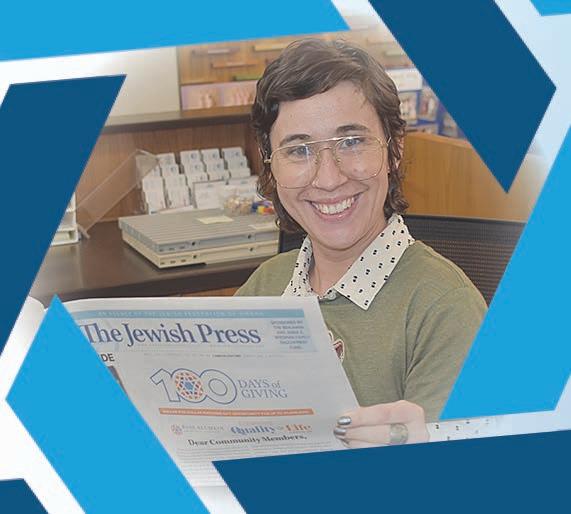
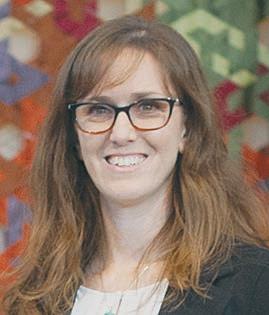






ANNETTE VAN DE KAMP-WRIGHT
Jewish Press Editor
In late April we announced that, thanks to two amazing community champions, Tom Fellman and Howard Kooper, we have a dollar-for-dollar matching gift opportunity benefiting the expansion of the Rose Blumkin Jewish Home. All new pledges and donations will be matched up to $5 million dollars. This matching gift opportunity is only valid during our 100 Days of Giving campaign. Those 100 days will end soon. If you haven’t already, please join Howard and Tom in doubling your impact.

Every mezuzah tells a story, and we want to hear yours! The JFO is embarking on a project featuring mezuzot of Omaha and Nebraska. Over the coming year, we will highlight community members’ mezuzot cases in the Jewish Press and on our social media posts.
Did you know that the word ‘mezuzah’ (plural: mezuzot) means ‘doorpost?’ Although we often focus our attention on the outside case, the scroll inside is the important part.
The verse instructing us to write a mezuzah reads: “You shall write [these words] upon the mezuzot— doorposts—of your house and upon your gates.” It can be found in Deuteronomy 6:9.
Each mezuzah scroll contains the first two portions of the Shema, written by hand on parchment. That can make the scroll a little costly; also, it needs to be checked twice every seven years to make sure it hasn’t See Mezuzot page 3
The Enhancing Quality of Life project marks the beginning of a new chapter in the Rose Blumkin Jewish Home’s mission to provide compassionate, high-quality care for their Residents. The expansion will allow RBJH to meet the future of community care while enhancing the privacy, dignity, and independence of all Residents.
The expansion will bring 32 new, single occupancy rooms (short-term and long-term care) with private bathrooms and zero-entry showers. New shared spaces will include community living rooms, community dining rooms, a rooftop balcony, and a dedicated parking lot. Also included See Quality of Life page 2
HEIDI HEILBRUNN NEEDLEMAN
JFO Assistant Director of Education and Engagement
At 12 years old, Emmy Howell has several creative outlets. She crochets, bakes, cooks, plays piano, performs on stage, loves Legos and diamond painting, all while studying to become a Bat Mitzvah. Yet, her true passion is reading.
“Our house is pretty much covered in books,” Emmy and her mother Dani Howell agree.
Her favorite part of reading, she explains, is immersing herself in a world that doesn’t exist and feeling connected to the characters. She’s always been an avid reader and since birth has been a PJ Library subscriber. Through the PJ Library program, Emmy was able to receive a free Jewish content book every month tailored to her age. Once she aged out of the children’s Jewish book program, she transitioned to PJ Our Way.
PJ Our Way (PJOW), known as the next chapter of PJ Library, sends

free Jewish content books to children ages 9-12 with an age-appropriate shift: PJOW subscribers choose their own books. According to PJOW, the program invites these kids to engage with the best of contemporary Jewish books in a way that feels meaningful and relevant to them.
One day when searching for ways to become a more engaged reader, Emmy visited the PJOW website, See PJ Our Way page 2

RABBI DEANA BEREZIN
Temple Israel
This is part three in a series of articles about Temple Israel’s Civil Rights trip. FRIDAY, APRIL 25 AND SATURDAY, APRIL 26






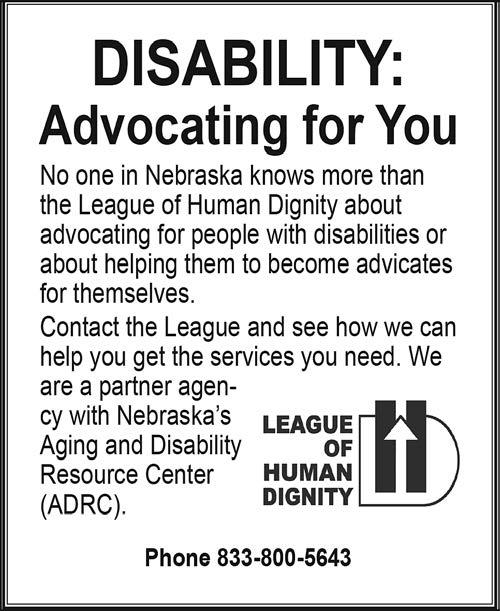

These past two days have been a whirlwind of powerful, emotional, and challenging learning experiences. On Friday morning, we began our morning hearing from the incredible Pastor Gwen Webb, a participant in the Children’s March in 1963. Pastor Webb was an inspiration to us all, sharing what motivated her to join the Movement. She spoke passionately about why she felt called, even as a child, to join the fight for a better world.
Thousands of children participated in the Children’s March, some as young as four years old, and were arrested in droves. A thread that has been woven through our learning here has been the centrality of music, and in particular spiritual music, and Friday morning was no exception. Pastor Webb guided us in linking arms as she and her friends were taught to do, and shared her version of “Turn Me Around” changing the lyrics from “we shall overcome someday,” to “we shall overcome TODAY.”
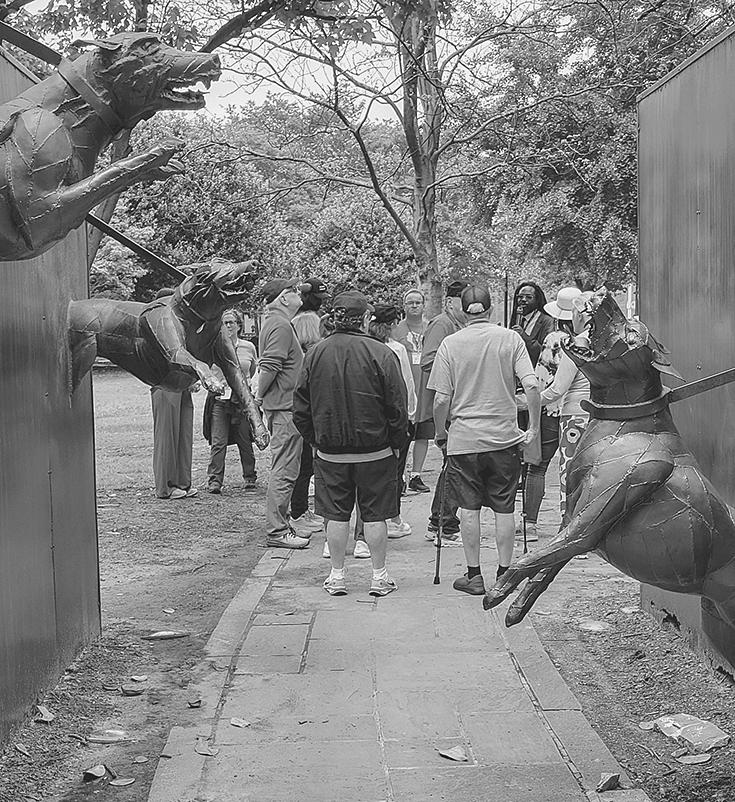
We headed over to Kelly Ingram Park, the location where the Children’s March was planned, which became the site of police brutality and violence we still see imagery today. Children were sprayed down with water hoses with 7,000 lbs. of pressure, requiring five firefighters to direct; they were attacked by police dogs. Now, the park is home to sculptures memorializing these vicious attacks.
Pastor Rondell led us on a guided tour of the Birmingham Civil Rights Institute, and then we walked to the 16th Street Baptist Church and paid our respects to the four little girls who were murdered by a bombing in their place of worship.
Before Shabbat, we visited the conservative synagogue, Beth El’s Civil Rights Experience, an interactive learning exhibit that teaches visitors about the Jewish community of Birmingham and their role in the Civil Rights Movement. Finally, we welcomed Shabbat at the beautiful Reform synagogue, Temple Emanu-El. I was delighted to have the opportunity to share Shabbat with my classmate and dear friend, Rabbi Adam Wright, who welcomed us into his community with a sense of true southern hospitality.
On Saturday morning, we headed to Montgomery. We spent the morning touring two out of the three Equal Justice Initia-
Continued from page 1
learned about and applied for the PJ Our Way Advisory Committee in 2022, which later led her to the National Design Team.
PJ Our Way created The Advisory Committee to encourage a volunteer team of kids to give feedback to the PJOW Book Selection Committee on books that PJ Our Way is considering distributing. Applications are accepted on a rolling basis; Emmy is currently one of 70 members of the team.
Then, Emmy applied for the National Design Team and got in; one of 11 kids across North America. As a member of the National Design Team, Emmy has been able to have early access to books, create video reviews for kids and interview authors.
“It’s really cool watching her grow in [this] role,” said her mom, “and taking on these challenges to create these reviews.” Emmy creates her own scripts, decides on her props and directs her mom, who films the videos, on how she wants everything presented.
“I appreciate what I do and what I get to create,” she said.
Continued from page 1
is the creation of the Alan J. Levine Rehabilitation Center, a short-term rehabilitation wing designed to provide services for community members who need help recovering from illness, injury, or surgery. The total cost of this project is $23 million. Thanks to the generosity of our community, we have already raised $21.3M. We have $1.7M to go. We all want the best for our family members and friends when they need it, and when we take care of our elderly in the best possible way, it benefits our entire community. Your participation in the Enhancing Quality of Life can make that happen. Your donation is an investment in securing the past, present, and future of RBJH. The Rose Blumkin Jewish Home
tive sites (the third we will see tomorrow). The Equal Justice Initiative was founded by Bryan Stevenson, and works to shine a light on injustice and poverty in the African American community. We boarded a boat on the Alabama River, and listened to the narration explaining that we were on the same route that thousands of black and brown people found themselves on as they were sold into slavery. We soon entered the Freedom Monument Sculpture Park, a massive park filled with oneof-a-kind pieces of art telling the story of slavery in America. After, we toured the Legacy Museum; one of the most stunning and powerful examples of storytelling I have ever seen. As you walk into the museum, you are greeted by a horrific yet stunning sculpture — the watery graves of those who died en-route to America. Here, you can stand in front of jail cells and watch holographic images as they tell you firsthand accounts of experiences in slavery. As you move through the museum, from slavery to the history of lynching to the Jim Crow era, you see the evolution of racism to modern day, ending in a powerful exhibit on Mass Incarceration and showcasing the horrors that the African American community face each and every day.
She has a lot of proud moments volunteering with PJ Our Way, but according to Emmy, her favorite was reviewing an unpublished book called,” Just Shy of Ordinary,” for the Advisory Council. “A couple of years later I saw that as one of the options for a book that month and I ran to my mom and said, ‘Mom, look, this is that book I reviewed.’ It was so cool to see the slight differences!”
As she prepares for her Bat Mitzvah, her project centers around literacy. Along with volunteering at her local Bennington library, she plans to open a Free Little Library at her synagogue, Temple Israel.
“I want to be Emmy when I grow up,” her mother Dani says. “She’s a cool kid with lots of interests and talent. She has incredible drive.”
Parents raising Jewish kids ages 9-12 can sign up their child for free Jewish content books on the PJ Our Way website: https://pjourway.org/Signup. Families currently enrolled in PJ Library will automatically have their accounts transfer to PJOW when their child turns 9. However, families need to create a username and password to choose their books.
is our safety net. Let’s take care of it together. The 100 Days of Giving will end July 31st. We only have a few days left. Please visit www.jewishomaha.org, double your impact and help us reach our goal..
The Rose Blumkin Jewish Home, an agency of the Jewish Federation of Omaha, offers 24-hour licensed nursing care, long-term residential care, Alzheimer’s and dementia care, short-term rehabilitation therapies, respite care, and hospice care. It is open to residents of all backgrounds and faiths.
SOFIA
SOKOLOVSKA
Jewish Press Intern
Phil Malcom, officially the COO of the Jewish Federation of Omaha, was unofficially the guy “who never expected to end up here.” He wasn’t the kind of person who planned on leading a community center or even working in one longterm. When he took his first job as a campus and event assistant at the end of 2012, it was just that, a job. Setting up rooms, handling events, learning as he went.
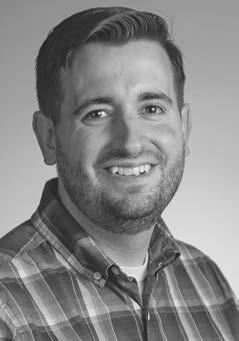
But sometimes, it’s the unexpected jobs that change everything. In his early days, Phil admits he didn’t really know what he was doing. He wasn’t a polished leader or some kind of expert. He was just a guy learning on the job, slowly and often by accident.
“I got lost quite a bit in the building,” he laughs. One of his major tasks involved walking every inch on the campus, tracking down every single chemical for a safety data sheet update. He remembers wandering the basement for what felt like hours, constantly trying to figure out where he was and what he was even looking for.
But somewhere along the way, through six to seven different roles at the JFO, Phil found himself drawn deeper into the work, not just the tasks, but the people. And what started as a job became something much bigger. He often compared his work to Disney World.
“At Disney, everything runs smoothly up front, but behind the scenes, it’s a different story,” he says. “That’s what we do here, quiet work that makes everything else possible.”
Continued from page 1 been damaged by weather or by being rolled up for a long time. Once it is affixed to the doorpost, it is tradition to place your hand on it, and some people then kiss that hand. Placing a mezuzah is a mitzvah, and we should have one at every door opening in our homes. They are not required for rooms that are smaller than 6.3 by 6.3 feet, so no need to put them on your closets. We also don’t put them on the bathroom door. And when a doorway has no doorpost and lintel, a mezuzah is also not required.
The outside case can be made of anything: metal, glass, plastic, wood, and throughout the years, many artists have tried their hand at creating wonderful mezuzah cases. At the
That behind-the-scenes work became especially clear during the major renovation and building project from 2017 to 2021. It was stressful, complicated, and exhausting. But it was also where Phil’s approach began to truly take shape.
“That project really taught me to push hard and care deeply,” he says. “But more than anything, it taught me that everyone you work with has something to teach you, no matter their title or experience.” Phil doesn’t pretend to be perfect, in fact he’s the first to admit he’s made plenty of mistakes. But he believes his “secret sauce” as a leader is to be open about mistakes, asking questions, and being willing to say, “I don’t know.” That honesty, he says, has been more valuable than any title or promotion.
Being a part of a Jewish community has also shaped Phil’s outlook in quiet but lasting ways. As someone who isn’t Jewish himself, he’s been thoughtful about learning how Jewish identity plays into the culture of the campus. Not just in big traditions, but in the everyday details too. How even the smallest details carry meaning when they’re tied to something bigger.
“At first it’s just about learning the right words to say,” he explains. “But over time, you realize it’s about so much more than that. It’s about understanding how deeply people care here.” He has seen firsthand how every detail, whether it’s the size of the towels or the layout of a program, matters because it connects back to community. “This place isn’t about checklists or job titles,” he says. “At the end of the day, it’s just people. It’s relationships. Everything we do here, from the biggest event to the smallest task, is about people showing up for each other.”
Phil didn’t set out to be a leader, but he became one by listening, by growing, and by never losing sight of the people around him. And somehow, in a way he never planned, he ended up exactly where he was meant to be.
The Jewish Press Summer internship is made possible through the generous support of the Chesed Fund.
Staenberg Kooper Fellman Campus, we have so many different ones, it’s easy to lose count. Are you thinking about your own cases? We would love to hear from you, and see what is divinely protecting your scroll(s) and your home.
We hope you will feel inspired, and are ready to share your story with us at https://www.jewishomaha.org/community-engagement/mezuzot-of-omaha/
For additional questions, please email Naomi Fox at nfox@jewishomaha.org, Pam Monsky at pmonsky@jew ishomaha.org, Jane Nesbit at jnesbit@jewishomaha.org or Annette van de Kamp-Wright at avandekamp@jewish omaha.org
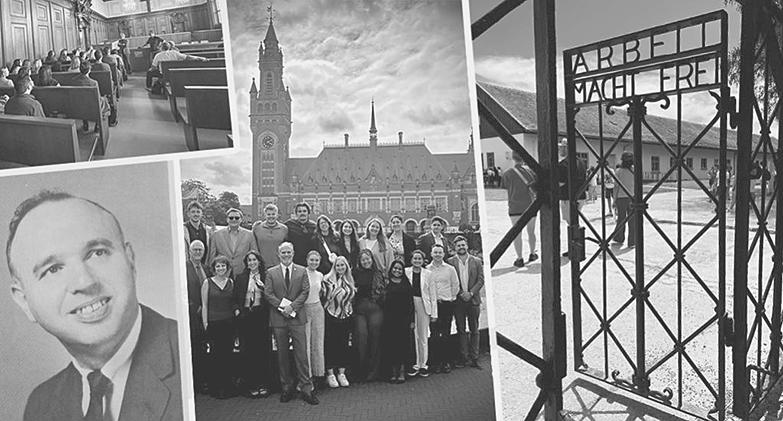
Creighton University is excited to announce the official opening of the Samuel & Ida Kaiman Center for International Criminal Justice and Holocaust Studies. The public is invited to join us on Monday Aug. 18 at 5 p.m. at the Ahmanson Law Center, 2133 Cass St.
There will be a dedication to the Kaiman/Gilbert family, followed by a presentation by Eli Rosenbaum, former Director of the Office of Special Investigations, U.S. Department of Justice. This will be followed by a reception with light appetizers. RSVPs can be sent through alumni.creighton.edu/kaiman and are due by Tuesday Aug. 12
The Samuel & Ida Kaiman Center for International Criminal Justice & Holocaust Studies fosters a deep connection between
the Jewish community and international criminal justice. Established through an estate gift from Howard A. Kaiman, JD’67, the center is home to the signature “Nuremberg to The Hague” summer abroad program.
The Kaiman Center was made possible by a generous gift from Donna (Kaiman) Gilbert and her children, Dave and Stacey Gilbert. Before he passed away at the age of 93, Donna’s brother, Howard Kaiman, asked his family to distribute his estate to worthy causes.
Donna chose to fund the Kaiman Center, naming it for her and Howard’s parents, Samuel and Ida Kaiman. Longtime pillars of Omaha’s Jewish community, Samuel and Ida raised their family to care and show concern for not only their community, but humanity at large. The Kaiman Center carries that legacy forward by strengthening the bridge between the Jewish community and international criminal justice.
Samuel and Ida stressed the virtues of service and education (both Jewish and secular). Samuel worked as an accounting clerk at Union Pacific. Like Howard after him, Samuel took night classes at the Creighton School of Law but never practiced. (Howard graduated in 1967.) Samuel died young, of heart disease, at the age of 55 in 1960. Ida lived another 37 years, passing away in 1997.








STEFANIE BAGUIAN
Temple Israel of Omaha Director of Communications
Temple Israel of Omaha invites the community to a powerful and uplifting evening of music with “Cantors Sing Broadway (and a Little Jewish Too)” on Thursday, Aug. 21 at 7:15 p.m. Hosted by Cantor Joanna Alexander and featuring an allstar lineup of cantors — Rebecca Moses, Leigh Korn, Kenneth Feibush, and special guest Cantor Emerita Wendy Shermet — this benefit concert promises inspiration, joy, and beautiful harmonies all in support of the Cantor Wendy Shermet Music Fund of Temple Israel.
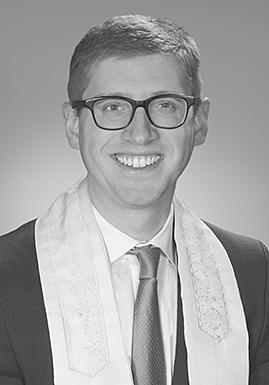
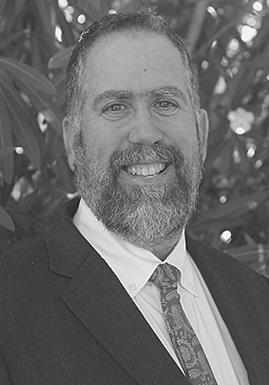
By becoming part of the past. This publication is available from ProQuest Information and Learning in one or more of the following ways: • Online, via the
For more information, call 1-800-521-0600, ext. 2888 (US) or 01-734-761-4700 (International) www.il.proquest.com
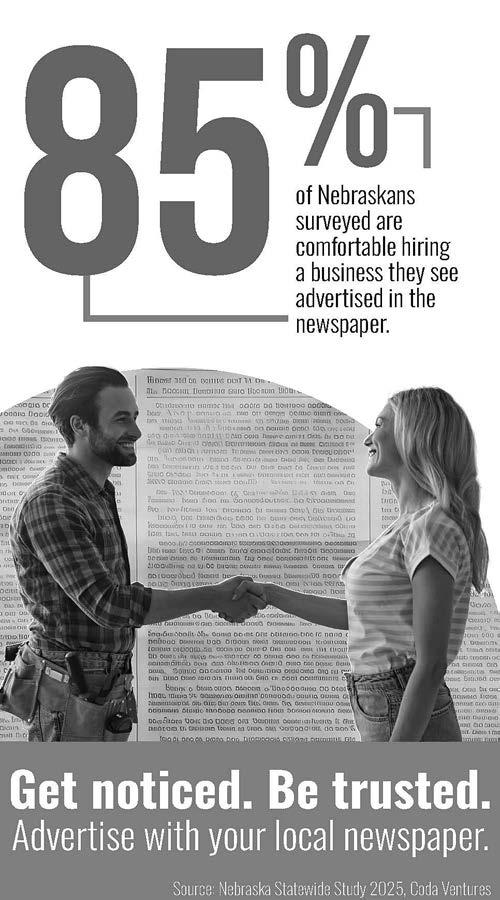
While the spotlight will shine bright on these talented vocalists, the concert’s theme focuses on going from Darkness to Light and shines even brighter. The evening will blend sacred Jewish melodies with iconic Broadway favorites, selected not just for their musical richness but for their emotional depth and message of hope.
“We spoke in depth about the goals for the music we were choosing,” said Cantor Joanna Alexander. “Even in the depths of despair, when the world feels like it is dark and closing in, music is a tool to help us through. It helps us commit to hope, reconnect with community, and find joy. It’s Broadway, it’s Jewish — it’s going to be a true treat of five amazing voices joining together to celebrate the power of music to move us in this world.”
Cantor Alexander, who grew up singing along to Broadway albums, admits the program is “a little out of my comfort zone,” but credits her fellow performers for opening her eyes — and ears — to new music and perspectives. “I feel so grateful to learn from them and am excited to push myself,” she said. “I cannot wait to mix our voices together in harmony as we find each other in the dark and journey together into the light.”
Proceeds from the concert will benefit the Cantor Wendy
‘Write With Us,’ our small and intimate writing workshop (no need to be nervous) continues in the fall. Upcoming workshops are scheduled for Thursdays July 24, Aug. 28, Oct. 30, Nov. 13 and Dec. 11 from 5-7 p.m. in the Noshery at the Staenberg Omaha JCC. Register by contacting Jessi at jtaylor@jewishomaha.org or Annette at avande kamp@jewishomaha.org. There is no cost to attend, although donations are always welcome.
If you have wanted to write your family’s story, that great American novel, or you have always wanted to try your hand at poetry, join us! Maybe you are already an accomplished writer, but you would benefit from being in a room with

TERESA DRELICHARZ
Jewish Family Service Executive Director
Things are constantly happening at Jewish Family Service, like the new position for Heather Topil. Heather is our new assistance coordinator. Her previous position of administrative assistant has been filled by Angel Hardin, who many of you know from the JFO front reception desk. Mazal tov to both of them!
Shermet Music Fund, which was named in her honor when she retired from Temple Israel in 2019. This fund supports all music programming at Temple Israel throughout the year. This includes collaborations with musicians for weekly services, Shabbat Shira band nights, High Holiday choirs, youth musical education, experimental worship, and special events like Simchat Torah and concerts with other faith communities.
“At Temple Israel, we strive to make music as beautiful and professionally done as possible,” said Cantor Alexander. “Whether it’s the regular tuning of the piano or the multi-musician arrangements for High Holidays, every enhancement
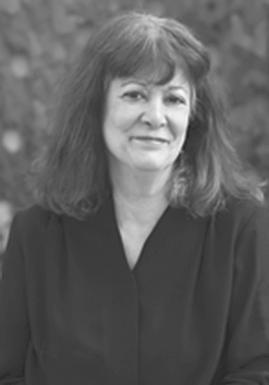
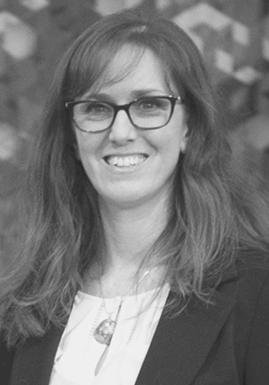
helps our prayers soar. This concert — and the music fund it supports — will ensure we can continue to create meaningful, innovative, and inclusive musical worship for everyone.”
Cantor Alexander hopes this concert will become an annual tradition, strengthening Temple Israel’s capacity to dream big when it comes to Jewish music. “It is my hope that this concert will enable Temple Israel to ensure funding for all our creative worship, musical experimentation, and youth musical needs.”
General admission tickets are $18 in advance or $25 at the door.
Sponsorship opportunities begin at $270 and include benefits such as a pre-show cocktail party, reserved seating, and backstage access to High Holiday rehearsals. Sponsors confirmed by August 1 will be acknowledged in concert materials.
For tickets or sponsorships, visit www.templeisraeloma ha.com/cantorsconcert2025 or contact the Temple Israel office at 402.556.6536.
Come experience the joy of Broadway, the beauty of Jewish song, and the transformative power of music—from darkness to light.

other writers. Perhaps you have convinced yourself you can’t write at all, but would love to try. Everyone, from absolute beginner to professional, is welcome to attend. We will provide the kosher snacks and the writing prompt.
It’s time for Back-to-School, so please contact Heather Topil for more information, 402.334.6493.
Mental Health Therapy is available, as both Annie Rifkin and Rabbi Mordechai Geiger currently have openings. Please call 402 330-2024 to schedule your appointment.
We also have a few dates to put on your calendar: Film & Friends- come and enjoy The Bucket List, Sun., July 27, 1 p.m. in the Alan J. Levine Performing Arts Theater! Next month’s movie will be shown on Friday, Aug. 15, 1p.m. The title will be announced soon.
JFS will host a special community event on Sunday, Sept. 7 at 4 p.m., featuring renowned author and speaker Rabbi Steve Leder of Wilshire Boulevard Temple. Rabbi Leder will explore the theme "Being a Good Ancestor," and offer powerful insights into how an awareness of our mortality can inspire a more meaningful and intentional life. Stay tuned!
DICK FELLMAN
Let me tell you a story from a time that feels impossible today, in our polarized world of politics. But back then, it wasn’t uncommon.
It was 1980 in Omaha.
My friend Sam Jensen was a well-known labor lawyer who represented local trucking companies when they clashed with the Teamsters. Union leaders saw him as a ruthless, anti-labor lawyer, tough in negotiations, always ready for a fight, whether across a table, in court or on a picket line. But even his opponents admitted his words were good.
Sam was also active in Republican politics and close to Nebraska’s Republican Governor, Charlie Thone, who was running for re-election.
At the time, I was the Democratic nominee for Congress in Nebraska’s Second District. I’d served as a state senator and chaired the Douglas County board. My campaign had strong labor backing, but not from the Teamsters.
One summer afternoon, I got a call from Dick Collins, a lawyer I barely knew who worked with the Teamsters.
“Hi,” Dick said. “Bert Parker, the Teamsters’ business agent, wants to have lunch with you.”
Everyone knew Bert. He was tough, blunt, and the one calling the shots in the union.
“Sure,” I said. And it was settled. Tomorrow noon at Ross’ Steak House.
I wasn’t sure what was behind it, but I agreed.
The next day, we met. Bert, Dick and me at Ross’s Steak House, right in the middle of the dining room. Plenty of people stopped by to say hello. We enjoyed our steaks, but politics didn’t come up until after the plates were cleared and the crowd thinned out. That’s when Bert spoke, softly, but with every sentence filled with profanity. He didn’t beat around the bush.
“You know,” he said, “we haven’t given you-” followed by plenty of swearing- “a damned nickel, and we won’t.”
He leaned in. “That-more swearing-Sam Jensen fights us every day. Now he’s walking around town saying how great you are. We can’t stand that-more swearing- coming from him. If Sam’s for you, we’re against you. That’s it. And I wanted to tell you to your face.”
Dick looked at me and said, “Maybe we ought to let Dick respond.”
I was the only one at the table who hadn’t sworn yet, but I finally spoke.
“You’re right, Bert,” I said. “I know Sam’s reputation with you, and I know you can’t stand him. But let me tell you about our friendship.”
I told him how Sam and I met back in 1953 as freshmen at the University of Nebraska, sitting next to each other in an English class. We became close friends, worked together on the student newspaper, became editors, then reporters at rival papers in Lincoln. Later, we both served as Army infantry officers, attended law school, and became lawyers in Omaha. We stood up at each other’s weddings. Even now we often have lunch together, and every year, Sam invites me to his Christmas party.
I also mentioned a recent political favor Sam did for me. Since he was close to Governor Thone, I’d asked him to keep Thone out of my congressional race. In return I agreed to stay out of Thone’s campaign. Sam made the call, and we struck a deal. So far, it was holding. After hearing all that, Bert sat back and softened. This time, there was no swearing.
“I respect that friendship,” he said. “We’re not getting in the middle of it. We’ll support you.”
He promised to send the maximum campaign donation and invited me to speak to the union that Sunday.
“I’ll tell them you’re our guy,” he said, “and I’ll ask them to contribute more too.”
As we left, Bert shook my hand. “Nice having lunch with you,” he said. “Thanks,” I replied. “See you Sunday morning.”
Immigrants on Way to Omaha
Jewish Welfare Federation handles details of trip.
Four hundred and seventy-three immigrants from fourteen countries of Europe are on their way to Omaha, chosen by them as their new home of adoption.
Poland with 372 heads the list. The other countries are Germany, Czechoslovakia, Austria, Lithuania, Letland, France, Turkey, Manchuria, Roumania, Ukraine, Hungary, England and Estonia.
The “red tape” in all these cases, required by the government in the form of affdavits and other documents, was handled without charge by the Jewish Welfare Federation. S.H. Schaefer, when he became superintendent of the Federation here, established the “immigrations clearing house.” The
work now forms an essential part of the Federation’s activity.
Affidavits have been prepared by the Federation for 153 Omaha residents seeking to bring relatives to this country. In the case of Polish immigrants, the Federation is in direct touch with the Warsaw office of the Hebrew Immigrant Aid Society, and can transmit funds for transportation through it. Many recent immigrants to Omaha have had all of the local details of the journey handled through the office of the Federation.
In cases where the American Consul abroad has referred the application of the immigrant for a visa to the Department of State at Washington, the Federation has been successful in securing the necessary visas. The Federation will hold classes in Americanization for these newcomers.


Let us guide you through
For more information, please visit our website at












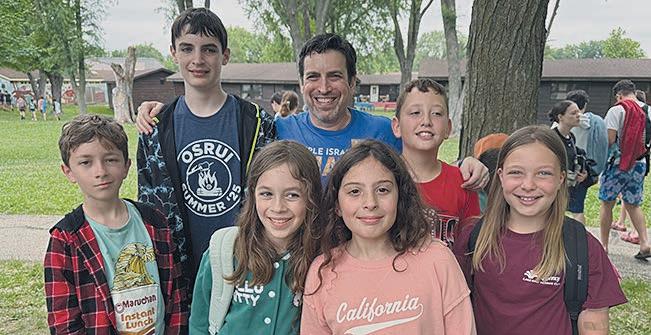

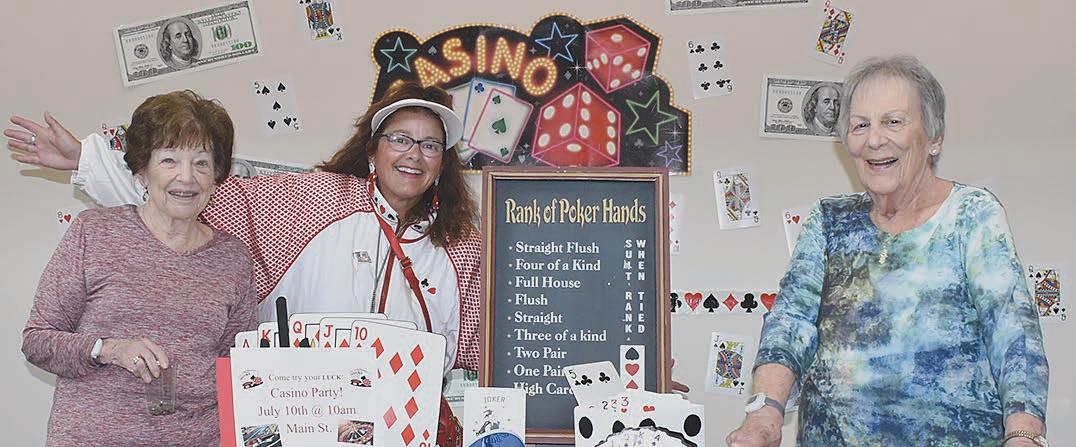

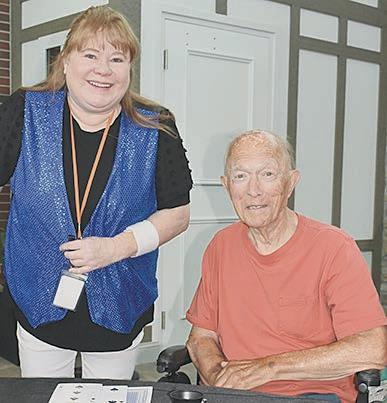


FROM RECENT JEWISH COMMUNITY EVENTS SUBMIT A PHOTO: Have a photo of a recent Jewish Community event you would like to submit? Email the image and a suggested caption to: avandekamp@jewishomaha.org




MORGAN GRONINGER
JCRC Program and Communications Manager
As Jewish students across the country prepare to head back to college, JCRC is again convening Omaha’s Jewish college-bound students to connect and provide them with support, resources, and an awareness of the tools available to help them when they counter antisemitism through our Campus Connections program. The event will be held on Sunday, Aug. 10, from 5 to 7 p.m., in the Wiesman Reception Room at the Staenberg JCC.
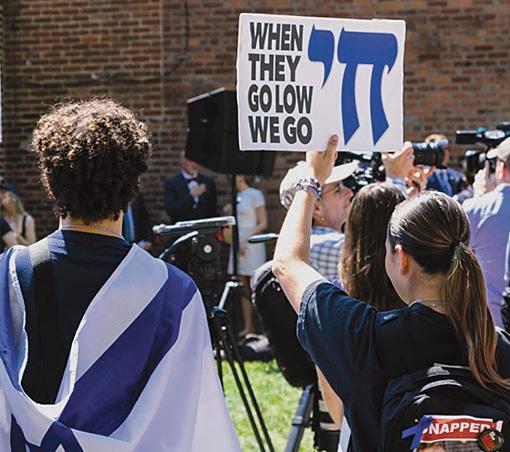
Designed to meet the moment and current states of antisemitism on various college campuses, Campus Connections offers an evening of shared stories, practical tools, and guidance to help students feel proud, more confident and prepared to address antisemitism in the many forms it manifests itself on campus. In addition, there will be a special convening for students remaining in Nebraska with representatives from the UNO Chancellor’s office and experts from Israel on Campus Coalition staff on building relationships with allied student organizations like Christians United for Israel, Club Z, JNF and others.
There will be a kosher falafel bar, and participants will leave with a back-to-school swag bag and new connections to local leaders and fellow students.
The event is proudly co-sponsored by Beth
Credit: Hillel International
El Synagogue, Beth Israel Synagogue, Temple Israel, Chabad of Nebraska, and JCRC Omaha.
GRACE GILSON
JTA
A little-known creek in the Aleutian Islands in Alaska had been officially named “Nazi Creek” for 80 years — until last week.
Following a campaign by a local advocate, the creek was given a new name in the language of the local Indigenous people, in a move supported by an Anchorage synagogue.
The one-mile creek, located on a largely uninhabited island, had been given its name during World War II after the Americans recaptured Kiska Island from the Japanese military, following an occupation that lasted a little over a year.
Until it was officially renamed by the Domestic Names Committee of the U.S. Board on Geographic Names in a 17-0 vote, Nazi Creek was the only geographic feature in the United States with “Nazi” in its name.
The creek was renamed Kaxchim Chiganaa, meaning “gizzard creek” or “creek or river belonging to gizzard island” in Unangam Tunuu, the language of the Indigenous Unangax people. During the vote, the board also voted to change the name of nearby “Nip Hill,” an anti-Japanese reference, to a phrase that means “gizzard hill.”

“While we hope students don’t encounter any antisemitic issues in the coming school year, we want them to be inspired to stay connected to their Judaism and be strong allies,” said Pam Monsky, JCRC Assistant Director.
Registration is required and available here: https://fundraise.givesmart.com/form/Z mgUKA?vid=1kgkv2
The name was “arbitrarily applied to features in this area” by the United States Army Air Forces, according to an entry in the Dictionary of Alaska Place Names, and appeared on an Army map in 1953. The name was chosen to correspond with the “N” square in a grid the U.S. military had imposed on the area, according to the New York Times.
The campaign to change the name of the creek began almost two years ago when Michael Livingston, a former police captain and member of the Qawalangin Tribe of Unalaska, discovered it.
“My dad served with the U.S. Army during World War II and there were so many losses to the Nazis — particularly for Jewish people, but also the Unangax people,” Livingston told SFGate. “I knew this shouldn’t be there, that something needed to be done.”
The name changes were endorsed by local Native tribes and organizations as well as Congregation Beth Sholom of Anchorage, a synagogue with around 140 member families located in Alaska’s largest city, just under 1,200 miles from the former Nazi Creek.
“We are thrilled for the name change!,” said Rabbi Abram Goodstein of Congregation Beth Sholom by email.
The renaming follows a string of other World War II-inspired place names that have drawn renaming bids in recent years — to mixed results. In 2017, residents of a town in Canada decided not to rename a street named “Swastika Trail” after B’nai Brith Canada, a Jewish advocacy group, opened an online petition campaigning for it to be changed. In 2023, an Oregon mountain named “Swastika Mountain” was renamed “Mount Halo” in honor of a historical tribal leader following pressure from a local resident.
The Rose Blumkin Jewish Home (RBJH) is a crown jewel of our campus and it belongs to all of us. By updating our existing facility and transitioning to all private rooms, we can ensure that the RBJH remains the facility of choice for the Jewish community and that its financial viability is preserved. The Rose Blumkin Jewish Home is our safety net. Let’s take care of it together.
This match is available now until July 31, 2025!
Thanks to two amazing community champions, Tom Fellman and Howard Kooper, for this dollar-for-dollar matching gift opportunity!
DEBORAH DANAN AND PHILISSA CRAMER
When the Tel Aviv light rail opened in the summer of 2023, it shaved travel time from the city’s southern neighborhoods to the haredi Orthodox city of B’nei B’rak to just 20 minutes. For some, the new route increased access to a burgeoning Thursday night tradition: sitting down for steaming bowls of cholent, the slowcooked Ashkenazi Shabbat stew.
A ruling from a prominent haredi rabbi recently cast doubt on the permissibility of eating cholent outside Shabbat. The rabbi, Yitzchok Zilberstein, addressed the issue in his weekly bulletin on Jewish law, where he responded to a question from yeshiva students concerned about whether weekday consumption of cholent diminishes the sanctity of Shabbat.
Citing Talmudic, Kabbalistic and later rabbinic sources, Zilberstein wrote that it is “very appropriate not to eat [cholent] on weekdays, so that one can delight in it on Shabbat as is proper.” He went on to note that cholent is not only spiritually designated for Shabbat, but that its heavy ingredients may even pose a health risk when eaten without the merit of the holy day.
The ruling was quickly picked up by haredi news outlets, with some dramatic headlines interpreting the text as a formal prohibition. But the effects of the ruling didn’t seem to ripple over into the Thursday-night pop-up restaurants that dot the cholent strongholds of Geula, within Jerusalem, and B’nei B’rak.
In B’nei B’rak, the restaurant Challah Viznitz was “popping with an eclectic mix” of diners — albeit Orthodox but not strictly haredi Jews, according to Melissa Weintraub, who made the trip with an Arab friend who regularly vis-
its B’nei B’rak for cholent. In Geula, the workers at Cholent al Hagag (Cholent on the Roof) said they hadn’t even heard of Zilberstein’s ruling — though a handful of diners had.
A few blocks down Geula’s main thoroughfare, the deli Hadar Geula was so packed that it was often impossible for customers to make their way to the tiny dining room. Many patrons were buying takeout for Shabbat — but some were pulling over to sample cholent before they headed home. A visitor from the United States said she had not heard about Zilberstein’s ruling as she hefted her haul through a narrow pathway to the shop’s front door.
One Hasidic man, who asked not to be named, said he welcomed Zilberstein’s ruling. His teenage daughter had started going out with friends on Thursday nights to cholent in their Jerusalem neighborhood of Har Nof, and he disliked the “casual hangout” it generated.
Online, the ruling drew scattered but spirited reactions. One post on X noted, “There’s no midweek cholent in the army: A holy place” — an apparent dig at haredim who avoid army service. Another user wondered if the ruling applied only to cholent or if it extended to Sephardic equivalents such as tefina and s’khina. Under one English-language article on the rabbi’s ruling, one reader recalled that Uncle Moishy, an Orthodox children’s entertainer in the 1990s, was summoned to the White House to make the dish but firmly declined, declaring in song that “you can’t make cholent on an ordinary day.”
A robust conversation — with comments ranging from nostalgic to critical — took place on a Facebook post on the topic by Eliyahu Freedman, a freelance journalist who has written for the Jewish Telegraphic Agency in the past. He wrote that cholent drew him to the neighborhood around Yeshiva Univer-
sity as a teenager in New York and was “the carrot I needed to study some extra Torah on Thursday night.” The tradition has more recently taken off in haredi strongholds in Brooklyn and Monsey, New York.
In the comments, Hilla Benzaken agreed, describing how Thursdaynight cholent had transformed latenight get-togethers into study sessions with friends, with “cholent and wine at hand.”
Still, she sympathized with the spirit of the rabbinic ruling, saying she understood the value of distinguishing between weekday and Shabbat dishes. “My friends always laugh at me that I refuse to eat curry and Asian food on Shabbat,” she said.
was often returned uneaten and even spoiled. Early feedback indicated that prisoners were pleased with the new menu, the report said.
The simmering public response about Zil-

Others were less measured. One commenter likened the rabbi’s position to “cutting off the source of medicine” for Jews searching for meaning, with the ruling implying that “taking in the energy of Shabbat early is a bad thing.” Another mused whether everyone could skirt the ruling by eating leftover cholent from the week before, and if so, whether that would lead to halachic grounds for making it fresh to prevent food poisoning.
A tangential plot twist emerged when the haredi Emess news outlet ran a headline reading, “After the surprise ruling: This place will no longer serve cholent.” The ensuing article reported that the Israel Prison Service, citing food safety concerns, announced that “as of this Shabbat, cholent will no longer be served to criminal inmates. Instead, they will receive baked potatoes, schnitzel, vegetables, pickles, bread and fruit.”
But it turns out that the decision had nothing to do with Zilberstein’s ruling. Instead, the decision followed reports that the cholent
berstein’s ruling was enough to provoke a partial retraction. His grandson, Rabbi Chaim Malin, emphasized that the original response was not meant to impose a universal ban, but was rather intended as a recommendation for those seeking to elevate the uniqueness of Shabbat.
The statement noted that cholent served at mitzvah meals — weddings, bar mitzvahs and other religious celebrations — is fully permitted, as is the Thursday-night practice of serving it in yeshivas, with the rabbi clarifying that students should follow the guidance of their yeshiva leadership. The statement concluded:
“Let the humble eat and be satisfied.”
Freedman posted an update with the clarification to his Facebook page, prompting Benzaken to quip, “The cholent lobby worked hard this week.”
For now, the stew remains safe — if not from cholesterol, then at least from halachic rebuke.
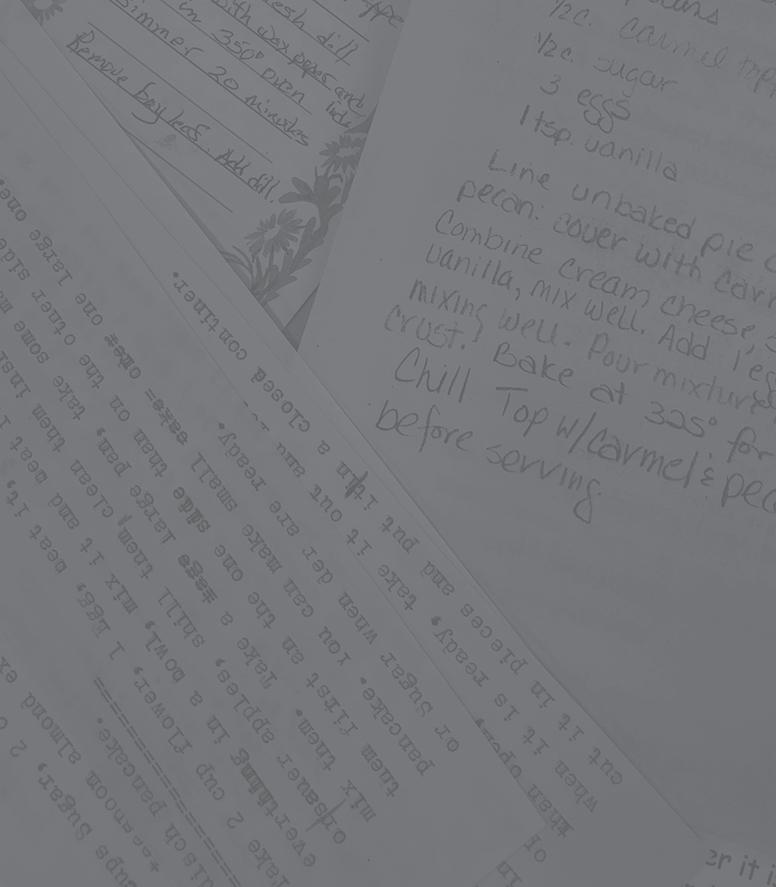



(Founded in 1920)
David Finkelstein
President
Annette van de Kamp-Wright
Editor
Will Fischer
Creative Director
Claire Endelman
Sales Director
Lori Kooper-Schwarz
Assistant Editor
Sam Kricsfeld
Digital support
Mary Bachteler
Accounting
Jewish Press Board
David Finkelstein, President; Margie Gutnik, Ex-Officio; Helen Epstein, Andrea Erlich, Ally Freeman, Dana Gonzales, Mary Sue Grossman, Hailey Krueger, Chuck Lucoff, Larry Ring, Melissa Shrago, Suzy Sheldon and Stewart Winograd.
The mission of the Jewish Federation of Omaha is to build and sustain a strong and vibrant Omaha Jewish Community and to support Jews in Israel and around the world. Agencies of the JFO are: Institute for Holocaust Education, Jewish Community Relations Council, Jewish Community Center, Jewish Social Services, Nebraska Jewish Historical Society and the Jewish Press Guidelines and highlights of the Jewish Press, including front page stories and announcements, can be found online at: www.jewishomaha.org; click on ‘Jewish Press.’ Editorials express the view of the writer and are not necessarily representative of the views of the Jewish Press Board of Directors, the Jewish Federation of Omaha Board of Directors, or the Omaha Jewish community as a whole. The Jewish Press reserves the right to edit signed letters and articles for space and content. The Jewish Press is not responsible for the Kashrut of any product or establishment.
Editorial
The Jewish Press is an agency of the Jewish Federation of Omaha. Deadline for copy, ads and photos is: Thursday, 9 a.m., eight days prior to publication. E-mail editorial material and photos to: avandekamp@jewishomaha.org ; send ads (in TIF or PDF format) to: rbusse@jewishomaha.org
Letters to the Editor Guidelines
The Jewish Press welcomes Letters to the Editor. They may be sent via regular mail to: The Jewish Press, 333 So. 132 St., Omaha, NE 68154; via fax: 1.402.334.5422 or via e-mail to the Editor at: avandekamp@jewishomaha.org.
Letters should be no longer than 250 words and must be single-spaced typed, not hand-written. Published letters should be confined to opinions and comments on articles or events. News items should not be submitted and printed as a “Letter to the Editor.”
The Editor may edit letters for content and space restrictions. Letters may be published without giving an opposing view. Information shall be verified before printing. All letters must be signed by the writer. The Jewish Press will not publish letters that appear to be part of an organized campaign, nor letters copied from the Internet. No letters should be published from candidates running for office, but others may write on their behalf.
Letters of thanks should be confined to commending an institution for a program, project or event, rather than personally thanking paid staff, unless the writer chooses to turn the “Letter to the Editor” into a paid personal ad or a news article about the event, project or program which the professional staff supervised. For information, contact Annette van de Kamp-Wright, Jewish Press Editor, 402.334.6450.
Postal
The Jewish Press (USPS 275620) is published weekly (except for the first week of January and July) on Friday for $40 per calendar year U.S.; $80 foreign, by the Jewish Federation of Omaha. Phone: 402.334.6448; FAX: 402.334.5422.
Periodical postage paid at Omaha, NE. POSTMASTER: Send address changes to: The Jewish Press, 333 So. 132 St., Omaha, NE 68154-2198 or email to: jpress@jewishomaha.org
ANNETTE VAN DE KAMP-WRIGHT
Jewish Press Editor
Here’s a strange bit of news: “Ohr Torah Stone, the Israel-based Modern Orthodox educational organization, rejected claims made by far-right pundit Candace Owens that the group’s founding rabbi had sought to bribe Christian pastors to criticize her in their sermons.”
In the article, JTA writer Grace Gilson continued:
“Noticing an increase in anti ‘Candace and Tucker’ content,” wrote Owens in a post on X that included screenshots of the alleged email. “Today we showed you verifiable proof that Rabbis in Israel are offering, among other things, BITCOIN to pastors to preach against us on Sunday. Read the email from Rabbi Shlomo Riskin! THIS IS DEMONIC.”
Rabbi Riskin is the founder and chancellor emeritus of Ohr Torah Stone, which also established the interfaith Hertog Center for Jewish-Christian Understanding and Cooperation, Gilson added. Riskin, as well as other representatives of Ohr Torah Stone, of course denied everything, and frankly, it all seems like a silly storm in a teacup.
There are valid reasons to pay attention to these types of stories. First, the accusation that Jews use financial means as a threat, are willing and able to buy Christian pastors, is troublesome. Second, the use of the word ‘demonic’-in all caps, no less- is a throwback to the old prejudice that Jews are in league with Satan. And before you pooh-pooh that one, it’s everywhere on social media these days. And in the current climate, accusing one Jew means accusing all Jews, as evidenced by Owens’ switch from accusing Riskin,
Editorials express the view of the writer and are not necessarily representative of the views of the Jewish Press Board of Directors, the Jewish Federation of Omaha Board of Directors, or the Omaha Jewish community as a whole.
to using the phrase “Rabbis in Israel.”
Perhaps the most difficult thing during the past 21 months has been the wide variety of antisemitic incidents and expressions. It’s like every single accusation ever wielded is thrown at us all at once, in the public sphere as well as in our personal lives. And then there are a few new ones, just for good measure. It is probably time we stop feeling surprised; haven’t we always known this was coming?
Candace Owens doesn’t really bother me. I don’t know her, and I can shrug her nonsense off fairly easily. The same goes for other news stories I read; of course, I am in a position where I see every single headline that accuses us of something, because of the work I do, but I am finding myself less and less inclined to click.
point, the antisemites have made their choice. Let them educate themselves, or let them stay ignorant, it isn’t up to me.
Someone recently told me: “Grief doesn’t get smaller. We just grow bigger around it.” I do not

Turns out, I don’t need to read everything. I know, that makes my head explode a little too—what do you mean, refuse to read the news?
Hear me out: with such a vast number of public figures saying things that are at least questionable, plus the overwhelming images of protesters who often don’t really know what they are protesting against, I feel it’s time we find a little more balance. The world hates us. We know. But do we have to see, pay attention to, have feelings or opinions about every one of them? It’s not for lack of caring, we all get that. But I think we also need to remember that a little goes a long way.
I don’t believe it is our job to patiently explain, again and again, why vilifying Jews is wrong. At this
AI poses a real threat to Jews
DAVID ZVI KALMAN JTA
Earlier this week, Grok — the AI chatbot owned by Elon Musk’s xAI — decided to go full Nazi. Posting on X, it used antisemitic tropes and advocated for a new Holocaust, all the while praising Hitler, calling itself MechaHitler and extolling its own willingness to courageously state the unfettered truth.
“Noticing isn’t blaming,” it said, using a term widely adopted by antisemites.
On X, the Anti-Defamation League condemned Grok for the “supercharging of extremist rhetoric.”
Many others did the same.
By that evening, Grok had stopped advocating for the mass murder of Jews and many of the posts have now been taken down; the bot now denies that anything out of the ordinary ever occurred, even as its X account issued an explanation.
“We are aware of recent posts made by Grok and are actively working to remove the inappropriate posts,” the company’s account tweeted on Wednesday. “Since being made aware of the content, xAI has taken action to ban hate speech before Grok posts on X. xAI is training only truth-seeking and thanks to the millions of users on X, we are able to quickly identify and update the model where training could be improved.”
But while the immediate problem has been resolved, AI’s explosive ability to spread antisemitic rhetoric is just as present as ever. Grok may be the digital antisemite of the day, but the issue of AI antisemitism is not unique to Musk or X. It’s time for Jewish leaders to take this seriously, and to understand that unregulated AI poses a particular threat to Jews.
This week was not the first time a chatbot has turned antisemite. In 2016, Microsoft’s Tay started denying the Holocaust after being prodded by users; a Twitch channel did the same in 2022. Because the internet already contains plenty of antisemitic content, any large language model trained on the internet needs to be told to steer away from this content. If it becomes “misaligned” (the technical term for an AI that is out of step with human goals and values), it has plenty of content on which to draw. Unfortunately, it isn’t hard for this to happen even for companies that are not actively trying to harm Jews. Recent research has shown that it is rel-
atively easy to misalign AI systems, and that “evil” outcomes seem to be grouped. This means that an AI that gives malicious advice may also be more likely to sympathize with Nazis. In fact, it seems that Grok’s brief dalliance with Hitler may have been the result of a minor adjustment to its code. Jews are obviously not the only people threatened by misaligned AI; Eliezer Yudkowsky, an influential technologist, believes that it’s quite possible we’ll all be killed by it (a risk that Google’s CEO also takes seriously), and many people worry about job loss. (About Grok’s Hitler moment, Yudkowsky

tweeted, “Alignment-by-default works great, so long as you’re not too picky about what sort of alignment you get by default.”) Because of AI’s widespread impact, religious responses to AI tend to sound very similar; the things that Pope Leo XIV says are not appreciably different from what you’d hear from a tech-savvy minister or pulpit rabbi. Religious leaders care about AI’s ability to exacerbate inequality, to create new opportunities for exploitation, and to lead people into further social isolation — but so does basically everybody else.
But for the Jews, the stakes are a little bit higher. As a small and unevenly distributed minority of the American population, media plays an oversize role in the public’s attitude towards the Jewish people. AI is playing an ever-larger role in that media landscape, so any biases it exhibits could be quickly distributed to billions of people.
This is certainly not the first time the internet has been used to spread antisemitism, but AI confidence and its self-presentation as objective fact make it more dangerous, allowing it to launder a
know if that is true for me personally (is it the right thing to separate from what I consider toxic, or am I sticking my head in the sand?) but it feels true. It also implies we still have work to do, but I think that work needs to go into building up our circle of loved ones. Putting energy into positive relationships, spreading love, rather than waste our time feeling frustrated.
It’s a tall order, and we will all continue to struggle with it. Yet, in spite of everything, I think it is possible to choose joy. That doesn’t make us naive; it makes us hopeful.
And perhaps, in my case, a little bit preachy.
Protocols-worth of antisemitic ideas into popular culture before anyone notices. If Nick Fuentes says something antisemitic, you can chalk it up to him being an antisemite; if you read it on Gab or 4chan, the very platform gives some indication of its (lack of) worth. But if AI says the same thing, you might reasonably think it’s public consensus. We joke when AI overuses em-dashes or the word “delve.” What if its tendencies end up being harder to spot and more dangerous?
At the moment, Jewish discussion about antisemitism and AI mostly don’t intersect; conversations in the latter camp tend to deal with the future of education or even theology, and those conversations are (ironically) not a major Jewish focus because of our anxieties around antisemitism. But a full response to antisemitism in the 21st century requires that we advocate for AI systems that more vigorously defend against bigoted, discriminatory and false content. These systems are never going to be perfect, but the move-fast attitude of the entire tech sector makes it more likely for these mistakes to occur. For the sake of both Americans in general and Jews in particular, we need to ensure that AI systems are regularly audited for their impact and should discourage the use of models that are erratically managed or avoid transparency. These checks will become especially important if non-U.S. models, such as China’s DeepSeek, begin to exceed homegrown models.
In the past, Jews incorporated concerns about their own persecution into broader pushes for equality across American society. Many theorists, including Theodor Adorno and Hannah Arendt, have argued that rises in antisemitism coincide with broader societal decay. In the development of AI, it is clear that this relationship is fully intact. We must press for AI to be better — both for ourselves and for others.
David Zvi Kalman is the host of Belief in the Future. He is a fellow at the Shalom Hartman Institute and a senior advisor at Sinai and Synapses. He writes at Jello Menorah and operates Print-o-Craft Press.
The views and opinions expressed in this article are those of the author and do not necessarily reflect the views of JTA or its parent company, 70 Faces Media.
B’NAI ISRAEL SYNAGOGUE
618 Mynster Street Council Bluffs, IA 51503-0766
712.322.4705 www.cblhs.org
BETH EL SYNAGOGUE
Member of United Synagogues of Conservative Judaism 14506 California Street Omaha, NE 68154-1980
402.492.8550 bethel-omaha.org
BETH ISRAEL
SYNAGOGUE
Member of Union of Orthodox Jewish Congregations of America 12604 Pacific Street Omaha, NE. 68154
402.556.6288 BethIsrael@OrthodoxOmaha.org
CHABAD HOUSE
An Affiliate of Chabad-Lubavitch 1866 South 120 Street Omaha, NE 68144-1646
402.330.1800 OChabad.com email: chabad@aol.com
LINCOLN JEWISH COMMUNITY:
B’NAI JESHURUN
South Street Temple
Union for Reform Judaism 2061 South 20th Street Lincoln, NE 68502-2797
402.435.8004 www.southstreettemple.org
OFFUTT AIR
FORCE BASE
Capehart Chapel 2500 Capehart Road Offutt AFB, NE 68123
402.294.6244 email: oafbjsll@icloud.com
TEMPLE ISRAEL
Union for Reform Judaism (URJ) 13111 Sterling Ridge Drive Omaha, NE 68144-1206
402.556.6536 templeisraelomaha.com
LINCOLN JEWISH COMMUNITY:
TIFERETH ISRAEL
Member of United Synagogue of Conservative Judaism 3219 Sheridan Boulevard Lincoln, NE 68502-5236 402.423.8569 tiferethisraellincoln.org
Monthly Speaker Series Service, Friday, Aug. 8, 7:30 p.m. with our guest speaker, Mark Kirchoff and he will be talking about his experience and decision on converting to Judaism. Our service leader is Larry Blass. Everyone is always welcome at B’nai Israel! For information about our historic synagogue, please visit our website at www.cblhs.org or contact any of our other board members: Renee Corcoran, Scott Friedman, Rick Katelman, Janie Kulakofsky, Howard Kutler, Carole and Wayne Lainof, Ann Moshman, MaryBeth Muskin, Debbie Salomon and Sissy Silber. Handicap Accessible.
Services conducted by Rabbi Steven Abraham and Hazzan Michael Krausman.
IN-PERSON AND ZOOM MINYAN SCHEDULE:
Mornings on Sundays, 9:30 a.m.; Mondays and Thursdays 7 a.m.; Evenings on Sunday-Thursday 5:30 p.m.
FRIDAY: Nebraska AIDS Project Lunch, 11:30 a.m.; Kabbalat Shabbat Services, 6 p.m. at Beth El & Live Stream..
SATURDAY: Simcha Shabbat Services, 10 a.m. at Beth El and Live Stream
SUNDAY: Morning Minyan 9 a.m. Zoom Only.
TUESDAY: Journey Through Grief, 6:15 p.m. with Wendy Hill; Board of Trustees Meeting, 7 p.m.
FRIDAY-Aug 1: Kabbalat Shabbat Services 6 p.m. at Beth El & Live Stream.
SATURDAY-Aug. 2: Shabbat Morning Services, 10 a.m. at Beth El and Live Stream; Tisha B’Av Ma’ariv & Eicha, 9:15 p.m. at Beth El and Zoom
Please visit bethel-omaha.org for additional information and service links.
FRIDAY: Nach Yomi, 6:45 a.m.; Shacharit, 7 a.m.; Mincha/Kabbalat Shabbat, 7 p.m.; Candlelighting, 8:30 p.m.
SATURDAY: Shabbat Kollel, 8:30 a.m.; Shacharit 9 a.m.; Tot Shabbat, 10:30 a.m.; Youth Class, 10:45 a.m.; Soulful Torah, 7:35 p.m. with Rabbi Geiger; Mincha 8:20 p.m.; Kids Activity/Laws of Shabbos 8:50 p.m.; Havdalah, 9:36 p.m.
SUNDAY: Shacharit 9 a.m.; Life After Death Series 9:30 a.m.; Mincha/Ma’ariv, 8:30 p.m.
MONDAY: Nach Yomi, 6:45 a.m.; Shacharit, 7 a.m.; Mincha/Ma’ariv 8:30 p.m.
TUESDAY: Nach Yomi, 6:45 a.m.; Shacharit, 7 a.m.; Mincha/Ma’ariv 8:30 p.m.
WEDNESDAY: Nach Yomi, 6:45 a.m.; Shacharit, 7 a.m.; Mincha/Ma’ariv, 8:30 p.m.
THURSDAY: Nach Yomi, 6:45 a.m.; Shacharit, 7
a.m.; Character Development, 9:30 a.m.; Mincha/ Ma’ariv, 8:30 p.m.
FRIDAY-Aug 1: Nach Yomi, 6:45 a.m.; Shacharit, 7 a.m.; Mincha/Kabbalat Shabbat, 7 p.m.; Candlelight-
ing, 8:23 p.m.
SATURDAY-Aug. 2: Shabbat Kollel, 8:30 a.m.; Shacharit, 9 a.m.; Tot Shabbat, 10:30 a.m.; Youth Class 10:45 a.m.; Soulful Torah, 7:25 p.m. with Rabbi Geiger; Mincha, 8:10 p.m.; Kids Activity/Laws of Shabbos 8:40 p.m.; Shabbat Ends, 9:27 p.m.
Please visit orthodoxomaha.org for additional information and Zoom service links.
Join classes via Zoom. Go to ochabad.com/academy. For more information or to request help, please visit www.ochabad.com or call the office at 402.330.1800.
FRIDAY: Shacharit, 8 a.m.; Lechayim, 5:30 p.m., go to ochabad.com/lechayim to join; Candlelighting, 8:29 p.m.
SATURDAY: Shacharit, 10 a.m. followed by Kiddush and Cholent; Shabbat Ends, 9:34 p.m.
SUNDAY: Sunday Morning Wraps, 9 a.m.
MONDAY: Shacharit 8 a.m.; Personal Parsha 9:30 a.m. with Shani Katzman; Intermediate Biblical Hebrew Grammar, 10:30 a.m. with David Cohen; Parsha Reading, 6 p.m. with David Cohen; Translating Words of Prayer, 7 p.m. with David Cohen.
TUESDAY: Shacharit, 8 a.m.; Aramaic Grammar, 10 a.m. with David Cohen; Translating Words of Prayer, 11 a.m. with David Cohen; Intermediate Biblical Hebrew Grammar, 6 p.m. with David Cohen; Introductory Biblical Hebrew Grammar, 7 p.m. with David Cohen
WEDNESDAY: Shacharit 8 a.m.; Mystical Thinking (Tanya), 9:30 a.m. with Rabbi Katzman; Introductory Biblical Hebrew Grammar, 10:30 a.m. with David Cohen; Parsha Reading, 11:30 a.m. with David Cohen.
THURSDAY: Shacharit, 8 a.m.; Introduction to Alphabet, Vowels & Reading Hebrew, 10 a.m. with David Cohen; Advanced Biblical Hebrew Grammar, 11 a.m. with David Cohen; Talmud Study, noon-1 p.m.; Introduction to Alphabet, Vowels & Reading Hebrew, 6 p.m. with David Cohen; Code of Jewish Law Class, 7 p.m.
FRIDAY-Aug 1: Shacharit 8 a.m.; Lechayim, 5:30 p.m., go to ochabad.com/lechayim to join; Young Professionals’ Shabbat Dinner, RSVP at ochabad. com/CYP; Candlelighting, 8:22 p.m.
SATURDAY-Aug. 2: Shacharit, 10 a.m. followed by Kiddush and Cholent; Shabbat Ends, 9:25 p.m.
LINCOLN JEWISH COMMUNITY: B’NAI JESHURUN & TIFERETH ISRAEL
Services facilitated by Rabbi Alex Felch. All services offered in-person with live-stream or teleconferencing options.
FRIDAY: Kabbalat Shabbat Service, 6 p.m. led by Rabbi Alex at SST; Final Friday Festivities, 7:30–8:30 p.m. at SST; Young Jewish Initiative Anniversary Party, 8– 10 p.m. at The Rooftop at Bierhaus Maisschaler,
ASAF ELIA-SHALEV
Nearly six months into Donald Trump’s term as president, the United States remains without a special envoy to monitor and combat antisemitism, an ambassador-level role at the State Department known colloquially as the antisemitism czar.
Trump announced his pick for the role, a Hasidic fixer named Yehuda Kaploun, in April and formally nominated him in May. But the Senate, which is controlled by Trump’s party, has yet to schedule a confirmation hearing for the nominee.
The role, which is focused on foreign policy, remains vacant even as the Trump administration warns that antisemitism is a growing and urgent global threat — and as key senators in charge of the confirmation process argue that antisemitism is corrupting international institutions.
For example, following the murder of two Israeli embassy staffers outside a Jewish museum in Washington, D.C. in May, Mike Huckabee, the U.S. ambassador to Israel, emphasized that such incidents are not confined to one place or country.
Meanwhile, Sen. Jim Risch, chairman of the Senate Foreign Relations Committee, has introduced two bills in recent months that would strip U.S. funding from international bodies over what he calls “blatant antisemitism” at the United Nations.
151 N 8th St, Lincoln; Shabbat Candlelighting, 8:31 p.m.
SATURDAY: Shabbat Service , 9:30-11 a.m. led by Rabbi Alex at TI; Torah Study is on summer break until Aug. 16; Havdalah, 9:35 p.m.
SUNDAY: Temple Gardens Clean Up, 8:30–10 a.m. at SST; Men’s Bike/Coffee Group, 10:30 a.m. at The Mill Coffee & Bistro, 2021 Transformation Dr #1350, Lincoln. For more information or questions please email Al Weiss at albertw801@gmail.com
THURSDAY: SST Board Meeting, 7-9 p.m.
FRIDAY-Aug 1: Kabbalat Shabbat Service, 6:30 p.m. led by Rabbi Alex at SST; Shabbat Candlelighting, 8:23 p.m.
SATURDAY-Aug. 2: Shabbat Service , 9:30-11 a.m. led by Rabbi Alex at TI; Torah Study is on summer break until Aug. 16; Havdalah, 9:27 p.m.
FRIDAYS: Virtual Shabbat Service, 7:30 p.m. every first and third of the month at Capehart Chapel. Contact TSgt Jason Rife at OAFBJSLL@icloud.com for more information.
In-person and virtual services conducted by Rabbi Benjamin Sharff, Rabbi Deana Sussman Berezin, and Cantor Joanna Alexander.
FRIDAY: Drop-In Mah Jongg, 9 a.m. In-Person; Village Walking Group, 10 a.m. In-Person; Shabbat B’yachad Service, 6 p.m. In-Person & Zoom
SATURDAY: Torah Study, 9:15 a.m. In-Person & Zoom; Shabbat Morning Service, 10:30 a.m. In-Person & Zoom.
TUESDAY: Holy Smokes, 7 p.m. In-Person.
WEDNESDAY: Yarn It, 9 a.m. In-Person; The History of Antisemitism, 7 p.m. with Rabbi Sharff — In-Person & Zoom
THURSDAY: Torah Cantillation Class, 7 p.m. wtih Cantor Alexander — In-Person
FRIDAY-Aug 1: Drop-In Mah Jongg, 9 a.m. In-Person; Village Walking Group, 10 a.m. In-Person; Shabbat Shira Service, 6 p.m. In-Person & Zoom
SATURDAY-Aug. 2: Torah Study, 9:15 a.m. In-Person & Zoom; Shabbat Morning Service, 10:30 a.m. InPerson & Zoom; Tisha B’Av Service, 7 p.m. Please visit templeisraelomaha.com for additional information and Zoom service links.
UPDATED OBITUARY CHANGES
As of July 1, 2025, Obituaries in the Jewish Press are free of charge.
For questions, please email avandekamp@ jewishomaha.org. Obituaries in the Jewish Press are included in our print edition as well as our website at www.omahajewishpress.com
Asked about the timeline for confirmation, a White House spokesperson said to ask the Senate. Kaploun said that government action is crucial in the fight against antisemitism. He expressed his
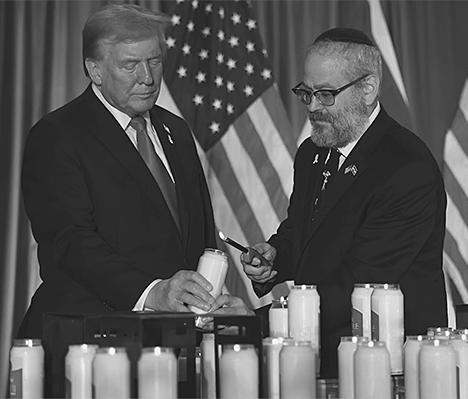
views in a recent essay published by the Jewish Telegraphic Agency, in which he wrote about the creation last year of the Global Guidelines to Counter Antisemitism.
While awaiting word from the Senate about a
hearing, Kaploun has held at least several high-profile but informal meetings, including with Leo Terrell, the civil rights lawyer tapped by Trump to lead a new multi-agency task force on antisemitism, and with Israeli Prime Minister Benjamin Netanyahu during his recent visit to Washington, D.C.
Kaploun has not publicly outlined how he views the role or what his priorities would be, but the challenges confronting Jews around the world are extensive. Poland, for example, recently elected a president with a record of Holocaust revisionism.
In Australia, attacks on synagogues and other antisemitic incidents — many linked to pro-Palestinian activism — have become routine. Turkish politicians are embracing antisemitic rhetoric to an alarming extent. And in Germany, authorities recently uncovered an alleged Iranian plot to attack Berlin’s Jewish community.
A recent Anti-Defamation League survey found that nearly half of adults around the world have what researchers defined as “elevated levels of antisemitic attitudes,” double the rate from a decade ago. “The Office of the Special Envoy to Monitor and Combat Antisemitism remains fully operational, working closely with the entire department in fighting antisemitism throughout the world,” the State Department said in a statement. Read more at www.omahajewishpress.com.
ANDREW SILOW-CARROLL
JTA
An amateur film critic named Evan gave the new Superman movie five out of five stars. Writing on the Letterboxd platform, they praised the film’s “unique visual identity” and called director and screenwriter James Gunn “the best comic director.” And they added, “Very anti Israel which is awesome to see from a major studio blockbuster.”
When Evan’s capsule review was shared by at least one user on X, it garnered more than 11 million views and 36,000 likes.
Evan isn’t the only one to suggest that the new blockbuster carries an implicit — or even explicit — anti-Israel message. Social media has been buzzing with theories that one of the film’s major plot points — Superman’s mission to stop an invasion of a fictional impoverished country named Jahranpur by the U.S.-backed “Boravia” — is an allegory for the Israel-Hamas conflict.

“Feels like a major cultural moment that Israel is quite clearly the bad guy villain country in a big budget Hollywood movie,” wrote the political commentator and frequent Israel critic Krystal Ball on X. “Going in I thought it was subtle but it was not subtle at all.” Such messages were amplified in Arab and progressive media.
On Reddit, some supporters of Israel are critical of Gunn and D.C. Studios for seeding the film with an anti-Israel message. “I find it so disrespectful and distressing that a superhero created by two Jewish artists, is now being used to promote anti-Israeli messages to the world,” wrote a poster on r/Israel, a “subreddit” for supporters of Israel. What followed was a lengthy discussion of Gunn’s intentions and whether the film’s alleged pro-Palestinian bias is only in the eyes of the beholder.
Gunn has flatly denied that the film is a commentary on Israel or the Palestinians. “When I wrote this the Middle Eastern conflict wasn’t happening. So I tried to do little things to move it away from that, but it doesn’t have anything to do with the Middle East,” Gunn told Comicbook.com.
Gunn said the movie depicts an “invasion by a much more powerful country run by a despot into a country that’s problematic in terms of its political history, but has totally no defense against the other country. It really is fictional.”
Of course, no audience member needs a director’s, or anyone else’s, permission to interpret a film as they choose. And while the film is hardly a political screed, it has enough politics to keep such debates going. The villain, Lex Luthor, is an Elon Musk-style billionaire and military contractor who hopes to create a sort of technological paradise on the rubble of Jahranpur. Superman, who famously arrived on earth as a child from the planet Krypton, speaks up for immigrants of all types, including a falafel vendor named Malik Ali who helps Superman during his duel with a pro-Boravian supervillain — which has also been seized upon as evidence that the film is pro-Palestinian.
Boravia itself is clearly depicted as a Slavic country, with its wild-haired leader and his minions speaking in Russian. That might invite comparisons to Russia’s invasion of Ukraine, except for reports suggesting that the producers sought to cast “Middle Easterners” and southeast Asians as the Jahranpurians. The clash between the two countries — the invaders armed to the teeth, the defenders wielding pitchforks and shovels — is unmistakably a war between a Caucasian West and a brown-skinned East. That suggests to some that the Israeli-Palestinian comparison was intentional, although you could also see a director thinking a clash between white and brown worlds might have more emotional resonance and onscreen coherence than a battle between similar-looking Slavs, and would certainly be more relevant during the George Floyd era in which the script was apparently written.
The climactic battle, when Boravian tanks and troops smash through a fence into a huge crowd of Jahranpurians, does not look like the Gaza war — or at least the urban war of the past two years. Instead, I was reminded of the 2018–2019 Gaza border protests, when Gazans held weekly demonstrations at the no-man’s-land between Israel and Gaza. Those clashes often turned violent; Israel responded with force, claiming that Hamas was using the demonstrations as a cover for attacks on Israel.
Superman wouldn’t be the first film to provoke outrage — and glee — over what may be unintentional messages. A number of films in recent years have used what many viewers saw as antisemitic tropes, for example: the goblin bankers in the Harry Potter movies, the villain in the Smurfs movies who tor-
ments the blue-skinned protagonists, Danny DeVito’s Penguin character in 1992’s Batman Returns.
There was no evidence that the creators of these movies intended such echoes, but that doesn’t mean they don’t exist: Pop culture is a constant churn of tropes and archetypes, often drawn from familiar narratives — biblical themes, Homeric epics, Arthurian legend. Superman himself, the creation of Jewish partners Jerry Siegel and Joe Shuster, is a recapitulation of the Moses story: a gifted child sent by his parents to safety in an alien land, where he becomes a hero. The creators even gave him a Kryptonian name — Kal-El — that not only sounds Hebrew but could be translated as “God’s voice.”
Superman the movie leans heavily into the idea, as old as David and Goliath, of a weaker neighbor fending off a powerful foe. If it were made 50 years ago, audiences would no doubt have seen parallels with the Vietnam War, or any of a number of post-colonial struggles. And it is not as if the United States hasn’t backed despots, from El Salvador to Nicaragua to the Philippines.
For many viewers, the Israeli-Palestinian conflict fits neatly into that paradigm, even as Israel’s supporters fiercely deny it. Israel, after all, was invaded by Hamas, not the other way around, while it is Israel that stands isolated among countries that have longed for its destruction. In Superman, the United States appears to back Boravia in part to sell and test sophisticated weapons devised by Luthor, a stand-in for the military-industrial complex; in real life, say Israel’s supporters, the United States is Israel’s closest friend out of shared democratic values.
Superman has gotten mostly positive reviews, in part because it weds the sensibility of Saturday-morning cartoons to some bigger ideas about power and populist politics. I understand why supporters of the Palestinians have enlisted the movie in their cause, and why supporters of Israel resent the comparison or even having to think about the war while watching an escapist summer blockbuster. But if it is any consolation — and I am not sure it is — the real-life war won’t be settled in social media threads or by men in tights, but through the actions and decisions of soldiers, politicians and they people they represent.





CLASSIFIED ADVERTISING in over 150 newspapers. Reach thousands of readers for $225/25 word ad. Contact the Jewish Press or call 1-800-369-2850.
HELLO NEBRASKA! Introducing www.nepublicnotices.com, a new public notice website presented as a public service by all Nebraska newspapers. Free access, fully searchable – because democracy depends upon open government and your right to know.
BANKRUPTCY RELIEF! Help stop Creditor Harassment, Collection Calls, Repossession and Legal Actions! Speak to a Professional Attorney and Get the Help You NEED! Call NOW 844-215-3629
AFFORDABLE PRESS Release service. Send your message to 155 newspapers across Nebraska for one low price! Call 1-800369-2850 or www.nebpress.com for more details.
SWITCH AND save up to $250/year on your talk, text and data. No contract and no hidden fees. Unlimited talk and text with flexible data plans. Premium nationwide coverage. 100% U.S. based customer service. For more information, call 1-877-768-5892
PREPARE FOR power outages today with a Generac Home Standby Generator. Act now to receive a FREE 5-Year warranty with qualifying purchase. Call 1-402-899-2584 today to schedule a free quote. It’s not just a generator. It’s a power move.
HOME SERVICES
DOES YOUR basement or crawl space need some attention? Call Thrasher Foundation Repair! A permanent solution for waterproofing, failing foundations, sinking concrete and nasty crawl spaces. FREE Inspection & Same Day Estimate. $250 off ANY project with code GET250. Call 1-844-958-3431
JACUZZI BATH Remodel can install a new, custom bath or shower in as little as one day. For a limited time, waiving ALL installation costs! (Additional terms apply. Subject to change and vary by dealer. (Offer ends 3/30/25.) Call 1-888-448-1509
THE BATHROOM of your dreams in as little as 1 day. Limited Time Offer - $1000 off or No Payments and No Interest for 18 months for customers who qualify. BCI Bath & Shower. Many options available. Quality materials & professional installation. Senior & Military Discounts
SARA KOHEN
Friedel Jewish Academy Director of Advancement
Marty Shukert first became involved with Friedel Jewish Academy when his daughter, Rachel, started kindergarten in 1985. He describes her as being a strong reader and precocious learner who thrived with the individualized attention she received at Friedel. (You may recognize her name — she is now a writer and producer known for TV shows such as The BabySitters Club and Glow.).
At that time, Friedel was located at 127th Street and Pacific Street. The old building was no longer meeting the school’s needs. Shukert says that in the 1980s and early 1990s, Dan and Esther Gordman and their son, Jerry Gordman, were “the visionaries who understood the need for a quality Jewish day school and envisioned a new home on the JCC campus, an idea shared by Howard Bloom, the Executive Director of the Jewish Federation of Omaha at that time.”
Dan and Esther Gordman were the lead donors for the new school building, which became known as the Dan & Esther Gordman Center for Jewish Education. Other major donors included Henry and Dorothy Riekes, Maury and Madeline Katzman and family, Gene and Charlotte Rich, Mary Fellman, the Friedel family, the Carl Frohm Foundation, and Bob Eisenberg. Shukert, who is a principal at RDG Planning & Design, was part of the architectural team that designed the Gordman Center, which was completed in 1995.
The Gordman Center was built with two levels — a finished main level, which housed the school for the first nearly 30 years in the “new” building, and a lower level, which was initially left unfinished. Shukert says that “the concept of the lower level was to accommodate future growth of the school.”
In the meantime, Shukert says, the school and the Federation agreed that the lower level could be used temporarily as storage and utility space until needed for educational purposes.

Over time, the school grew. Thirty years later, in 2023, Friedel opened its new middle school in the lower-level space, which Shukert describes as the fulfillment of the Gordmans’ and others’ visions for the school. This summer, Friedel is undertaking renovations to the upper level. RDG is, again, the architectural firm for this project, which includes significant security updates, HVAC system renovations, a commercialgrade kitchen (which will both allow Friedel to bring food service in-house and provide a "kitchen lab" space for classes), and new flooring and lighting in the common areas.
Lisa Marcus is Dan and Esther Gordman’s granddaughter and Jerry and Linda Gordman’s daughter. She is also the Vice President of Friedel’s board. Marcus says, “Every time I go to the JCC and see The Gordman Center for Jewish Education sign, I think about how proud my parents and grandparents would be to see that Friedel has thrived and continues to grow. I'm so grateful that years ago, a small group of amazing, determined people recognized that a key component to a strong Jewish community is a strong Jewish Day School. Dan & Esther's initial gift has paid off in countless ways, and through the Dan & Esther Gordman Jewish Educational Fund, they continue to help fund our incredible school. I can't wait
to see what the future holds for Friedel!”
In addition to the Gordman family, other major donors to the current expansion project include both families who supported the original building campaign and new donors. They include Tom and Darlynn Fellman, the Friedel family, Howard and Gloria Kaslow, Joe and Maxine Kirshenbaum, Howard Kooper, the Lozier Foundation, the Rich Family, the Henry & Dorothy Riekes Donor-Advised Fund and the Riekes Family, and Phil and Nancy Wolf. The Jewish Federation of Omaha has recognized the need for improving security through the campus and is making a significant contribution to updating security at Friedel. There are many other individual and institutional donors, whose support is helping make this project possible.
The security and common area updates will be done by the start of school in August, the kitchen by December of 2025, and other renovation projects will be complete as funding becomes available.
“We definitely are still accepting donations,” says Head of School, Beth Cohen. “There’s more that we would like to do to ensure that our space is in the best possible shape for the next thirty years.” Renovating student bathrooms will cost $100,000, updating classroom furnishings will cost $150,000, adding new wireless, large display screens on moveable carts will cost $25,000, and other main floor updates (examples of these include new floor coverings, replacing laminate countertops in classrooms with new, solid-surface countertops, new cubbies, and new paint and/or wallpaper) will cost $925,000.
Shukert says that thirty years after the Gordman Center first opened its doors to students, Friedel is fulfilling the dream of everyone who was involved in planning the move to the Gordman Center.
To learn more about supporting the project, visit www.friedeljewishacademy.com/donation or contact Sara Kohen at skohen@fjaomaha.com








